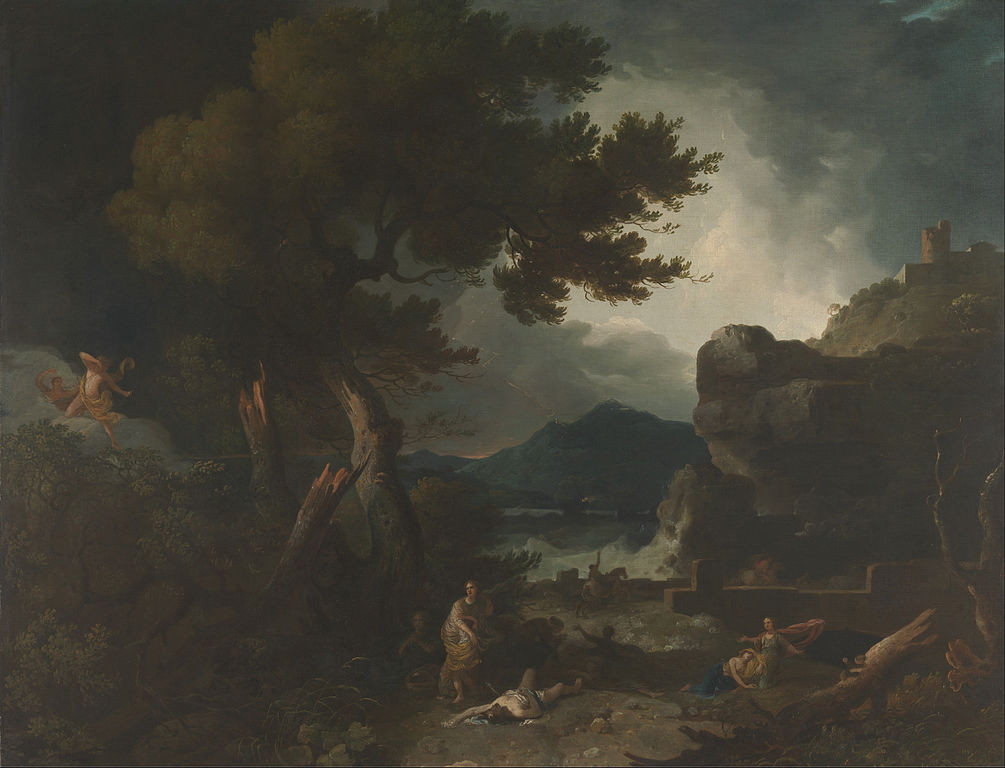Niobe in Distress for her Children slain by Apollo

Wheatley must have seen this painting in London in the summer of 1773, when she had come there from Boston to supervise the publication of her volume of poetry. Now at the Yale Center for British Art, this painting is enormous, about five feet by six feet, and it is not surprising that Behn, who had already read the story from Ovid’s Metamorphoses, was impressed.
Metamorphoses, of Mr. Richard Wilson.
Inspire with glowing energy of thought,
What Wilson painted, and what Ovid wrote.
Muse! lend thy aid, nor let me sue in vain,
O guide my pen in lofty strains to show
The Phrygian queen, all beautiful in woe.
Niobe dwelt, and held her potent reign:
See in her hand the regal sceptre shine,
The wealthy heir of Tantalus divine,
To approach the tables of the gods above:
Her grandsire Atlas, who with mighty pains
Her other grandsire on the throne on high
Her spouse, Amphion, who from Jove too springs,
Divinely taught to sweep the sounding strings.
Seven sprightly sons the royal bed adorn,
And decks the orient realms with rosy light
From their bright eyes the living splendors play,
Nor can beholders bear the flashing ray.
New beauties kindle, and new joys arise!
No words could tell them, and no pencil paint,
Thy love too vehement hastens to destroy
Each blooming maid, and each celestial boy.
The past to explore, the future to reveal.
The Theban maids to hear the orders ran,
Thus Manto spoke. The Theban maids obey,
And pious tribute to the goddess pay.
The rich perfumes ascend in waving spires,
The fair assembly moves with graceful air,
And leaves of laurel bind the flowing hair.
Niobe comes with all her royal race,
Her Phrygian garments of delightful hue,
Inwove with gold, refulgent to the view,
Beyond description beautiful she moves
She views around the supplicating train,
And shakes her graceful head with stern disdain,
Proudly she turns around her lofty eyes,
And thus reviles celestial deities:
Their brows unbound, and left the rights unpaid.
The angry goddess heard, then silence broke
While their great masters held the golden reins.
Ismenus first the racing pastime led,
Before his eyes in shadows swims the plain,
Was struck the first, first mingled with the dead.
Then didst thou, Sipylus, the language hear
Of fate portentous whistling in the air:
Two other brothers were at wrestling found,
And in their pastime claspt each other round:
Transfixt them both, and stretcht them on the sand:
And sought the gloomy mansions of the dead.
Alphenor saw, and trembling at the view,
Alphenor fails in this fraternal deed,
Soon as the arrow left the deadly wound,
What woes on blooming Damasichon wait!
His sighs portend his near impending fate.
Just where the well-made leg begins to be,
And the soft sinews form the supple knee,
The youth sore wounded by the Delian god
Bereft of sense, he drops his head, and dies.
But ah! too late, for he had sent the dart:
The fates refuse that arrow to recal.
On the swift wings of ever flying Fame
Niobe heard, and with indignant eyes
Niobe now, less haughty than before,
With lofty head directs her steps no more
She, who late told her pedigree divine,
On each pale corse the wretched mother spread
By her distresses more presumptuous grown.
Near the pale corses stood their sisters fair
One, while she draws the fatal shaft away,
Faints, falls, and sickens at the light of day.
To sooth her mother, lo! another flies,
And blames the fury of inclement skies,
And, while her words a filial pity show,
Now from the fatal place another flies,
Falls in her flight, and languishes, and dies.
While the sixth seeks some gloomy cave in vain,
Struck with the rest, and mingled with the slain.
In vain she begs, the Fates her suit deny,
In her embrace she sees her daughter die.
* This Verse to the End is the Work of another Hand.